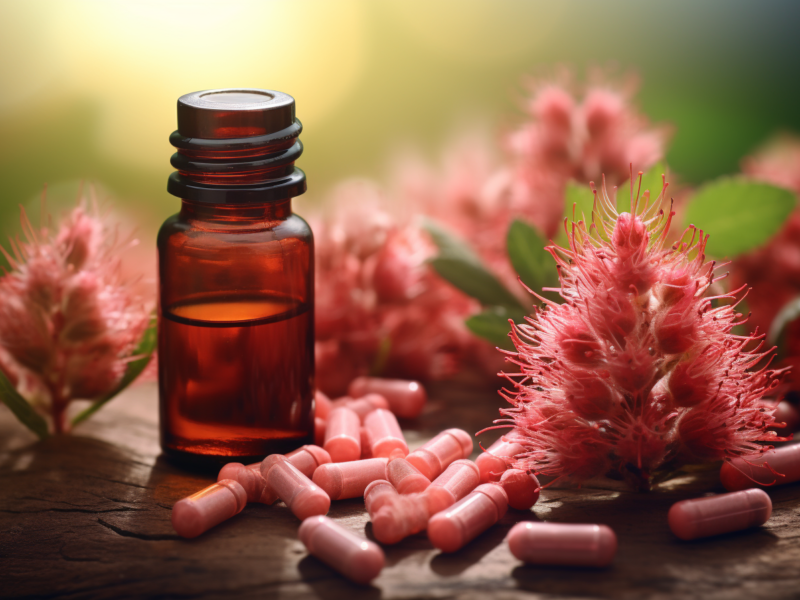I’m all for giving it a try. I mean, why not? It’s natural, and it’s been known to have some pretty great effects. Plus, it’s easy to take – just a simple ingestion and you’re good to go. So, if you’re looking for a way to give your body and mind a boost, Rhodiola Rosea might just be the answer. Give it a try – you won’t regret it!
What is Rhodiola Rosea?
Rhodiola rosea, also known as golden root, is an adaptogenic herb that has been used for centuries to help people cope with stress and fatigue. It is a powerful adaptogen, meaning it helps the body adapt to physical and mental stressors. Studies have shown that rhodiola rosea extract can stimulate the body’s natural defenses, improve endurance, and enhance mental performance.
The active ingredients in rhodiola rosea are salidroside and rosavins, compounds that have been found to have numerous health benefits. Studies have shown that supplementation with rhodiola rosea can improve exercise performance, reduce perceived exertion, and boost your energy. In one study, active men who took a single dose of rhodiola rosea before exercise had significant improvement in strength and endurance. Another study found that rhodiola may be effective in improving mental performance in people living at high altitudes. Animal studies have also shown that rhodiola may help reduce symptoms of depression and chronic fatigue symptoms. It is recommended to take rhodiola rosea in capsule form on an empty stomach for the best health benefits.
How Can Rhodiola Rosea Help Boost Your Energy?
Rhodiola rosea, also known as golden root, is an herbal supplement that has been used for centuries to improve energy and reduce fatigue. It has been studied in clinical trials and has been found to have a variety of health benefits, including anti-inflammatory effects, increased energy, and improved physical strength. A recent study evaluated the effects of rhodiola rosea supplementation on sport performance and antioxidant capacity in physically active men. The study found that after 8 weeks of treatment, the rhodiola rosea treatment group had a significantly lower heart rate during exercise and improved perceptions of exertion compared to the placebo group.

In another study, researchers compared the effects of rhodiola rosea supplementation on mental performance and physical fatigue in healthy adults.
The study found that after one week of treatment, the rhodiola rosea group had significantly improved capacity for mental work and physical strength compared to the placebo group.
Furthermore, the study found that rhodiola rosea was better tolerated than other herbal supplements, with fewer side effects. This suggests that rhodiola rosea has the potential to improve energy and reduce prolonged or chronic fatigue symptoms. Additionally, rhodiola rosea has been found to have adaptogenic effects, which may help to reduce symptoms associated with stress. Therefore, using rhodiola rosea may be beneficial for those looking to improve energy and work productivity.
Effects of Rhodiola Rosea on Exercise Performance
Wow, Rhodiola Rosea is a rat of a plant! It has some serious benefits of rhodiola that can help with exercise performance. It’s an antidepressant, so taking rhodiola supplements can help with mood and energy levels. The main compound in rhodiola is rosavin, and it has the potential to improve exercise performance. Whether rhodiola rosea has been used for centuries or not, it’s clear that it has some serious health benefits.
Studies have shown that ingestion of rhodiola can reduce heart rate during exercise, and it can also help with other health conditions. Effects of chronic and short-term golden root supplementation have been studied, and it’s been found that an acute dose of rhodiola enhances cell regeneration and energy metabolism. Rhodiola improves strength performance and exercise performance by decreasing fatigue and increasing endurance. Studies have also shown that rhodiola could improve exercise performance by decreasing RPE and exercise heart rate.
So, if you’re looking for a natural way to improve your exercise performance, rhodiola rosea l might be the answer. Taking rhodiola every day can help you get the most out of your workouts, and it has fewer side effects and was better tolerated than other supplements. So, why not give it a try and see if it can help you reach your fitness goals?
Clinical Studies on Rhodiola Rosea
Wow, rhodiola rosea is really something! Clinical studies have shown that this golden root has the potential to provide some serious health benefits. For instance, studies have shown that the ingestion of rhodiola rosea can favorably influence the heart rate during exercise. Not only that, but the effects of an acute dosage of rhodiola rosea have been shown to increase energy metabolism. Plus, the effects of short-term golden root ingestion have been shown to improve physical performance. All in all, it looks like rhodiola has the potential to be a great addition to any health regimen. Who knew that such a small root could have such a big impact on our health?
Pharmacological Effects of Rhodiola Rosea
Wow, I’m so excited to learn about the pharmacological effects of Rhodiola Rosea! It’s amazing how this plant can have such a positive impact on our health. Ingestion of Rhodiola Rosea has been shown to favorably influence heart rate during exercise, as well as energy metabolism by increasing the body’s ability to use oxygen. This means that it can help us to exercise for longer and with more intensity. Not only that, but the health benefits of Rhodiola Rosea don’t stop there. Studies have also shown that it can reduce the rate of perceived exertion (RPE) during exercise, meaning that we can push ourselves further without feeling as tired. All in all, Rhodiola Rosea is a great way to get the most out of our workouts and improve our overall health.

Dose of Rhodiola Rosea
I’m all for taking a dose of Rhodiola Rosea! It’s a natural supplement that’s been known to have some pretty awesome benefits. It’s been said to help with physical and mental fatigue, and even improve cognitive performance.
Plus, it’s been shown to favorably influence RPE and exercise, and even reduce heart rate during exercise. Talk about a win-win! I’m all for giving it a try. I mean, why not? It’s natural, and it’s been known to have some pretty great effects. Plus, it’s easy to take – just a simple ingestion and you’re good to go. So, if you’re looking for a way to give your body and mind a boost, Rhodiola Rosea might just be the answer. Give it a try – you won’t regret it!
Rhodiola Rosea May Help with Symptoms of Depression
Depression can be a real downer, but there may be a natural way to help lift your spirits. Rhodiola Rosea is a herb that has been used for centuries to help with symptoms of depression. Studies have shown that regular ingestion of this herb can help reduce feelings of sadness and fatigue, as well as improve overall mood.
Exercise is also a great way to help with depression, and Rhodiola Rosea may be able to help with that too. Studies have shown that taking this herb can help reduce heart rate during exercise, making it easier to stay active and get the endorphins flowing. So if you’re feeling down, why not give Rhodiola Rosea a try? It could be just the pick-me-up you need!
Rhodiola Rosea at High Altitudes
At high altitudes, Rhodiola Rosea is a powerful ally. It’s been used for centuries to help people cope with the physical and mental demands of living in the mountains. Studies have shown that regular ingestion of Rhodiola Rosea can help reduce exercise-induced heart rate and improve overall physical performance.
What’s more, Rhodiola Rosea has been found to have a positive effect on mood and mental clarity. It’s been used to help people cope with the stress of living in high altitudes, and to help them stay focused and alert. So if you’re looking for a natural way to help you cope with the demands of living in the mountains, Rhodiola Rosea is definitely worth a try!
Should You Take Rhodiola Rosea?
Well, should you take Rhodiola Rosea? It’s a tough call. On the one hand, it’s been used for centuries in traditional medicine and is said to have a range of benefits, from improving mood to reducing fatigue. On the other hand, there’s not a lot of scientific evidence to back up these claims. So, it’s really up to you to decide if it’s worth a try.
If you do decide to give it a go, make sure you do your research first. It’s important to be aware of the potential side effects and to be mindful of the recommended dosage. Also, it’s worth noting that Rhodiola Rosea may interact with certain medications, so it’s best to check with your doctor before ingestion. Additionally, it’s been suggested that Rhodiola Rosea may help to reduce heart rate during exercise, so it could be worth considering if you’re looking to improve your performance. All in all, it’s a personal decision, so weigh up the pros and cons before making your choice.

Conclusion
In conclusion, it is clear that ingestion of food and beverages prior to exercise can have an effect on heart rate. Studies have shown that the type of food and beverage ingested, as well as the timing of ingestion, can have an impact on heart rate during exercise. Carbohydrate-rich foods and beverages consumed prior to exercise can increase heart rate, while protein-rich foods and beverages can decrease heart rate. Additionally, the timing of ingestion can also affect heart rate, with ingestion of food and beverages closer to the start of exercise resulting in a higher heart rate than if the same food and beverage were consumed further away from the start of exercise. Therefore, it is important to consider the type and timing of food and beverage ingestion prior to exercise in order to optimize heart rate during exercise.
FAQ’s:
Q1. What are the potential benefits of ingesting Rhodiola Rosea?
A1. Rhodiola Rosea has been shown to have potential benefits such as increased energy, improved exercise performance, and improved heart rate.
Q2. How does Rhodiola Rosea work to boost energy?
A2. Rhodiola Rosea works to boost energy by increasing the body’s ability to produce and utilize energy, as well as by increasing the body’s resistance to physical and mental fatigue.
Q3. What are the recommended dosages of Rhodiola Rosea for energy boost?
A3. The recommended dosage of Rhodiola Rosea for energy boost is typically between 200-600mg per day.
Q4. Are there any side effects associated with Rhodiola Rosea ingestion?
A4. While Rhodiola Rosea is generally considered safe, some people may experience side effects such as insomnia, irritability, and restlessness.
Q5. Does Rhodiola Rosea improve exercise performance?
A5. Yes, Rhodiola Rosea has been shown to improve exercise performance by increasing energy levels and reducing fatigue.
Q6. Does Rhodiola Rosea improve heart rate?
A6. Yes, Rhodiola Rosea has been shown to improve heart rate by increasing the body’s ability to produce and utilize energy.
Q7. Is Rhodiola Rosea safe for long-term ingestion?
A7. Yes, Rhodiola Rosea is generally considered safe for long-term ingestion, however it is recommended to consult with a healthcare professional before taking any supplement.



 Managing Mental Fatigue | Rhodiola Rosea’s Effects
Managing Mental Fatigue | Rhodiola Rosea’s Effects
